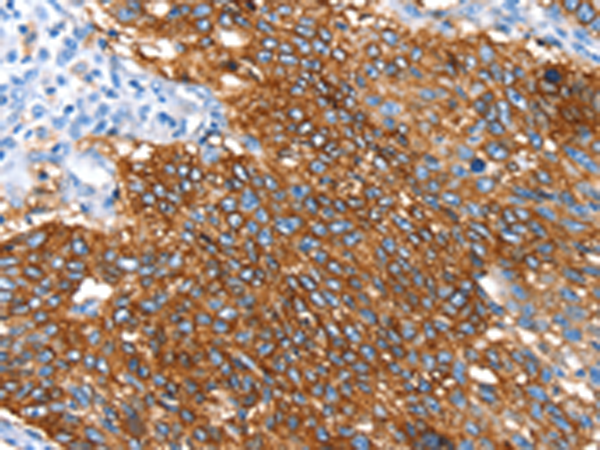

| WB | 咨询技术 | Human,Mouse,Rat |
| IF | 咨询技术 | Human,Mouse,Rat |
| IHC | 1/25-1/100 | Human,Mouse,Rat |
| ICC | 技术咨询 | Human,Mouse,Rat |
| FCM | 咨询技术 | Human,Mouse,Rat |
| Elisa | 1/2000-1/5000 | Human,Mouse,Rat |
| WB Predicted band size | 47 kDa |
| Host/Isotype | Rabbit IgG |
| Antibody Type | Primary antibody |
| Storage | Store at 4°C short term. Aliquot and store at -20°C long term. Avoid freeze/thaw cycles. |
| Species Reactivity | Human, Mouse, Rat |
| Immunogen | Synthetic peptide of human SNX5 |
| Formulation | Purified antibody in PBS with 0.05% sodium azide and 50% glycerol. |
+ +
以下是关于SNX5抗体的参考文献示例(注:内容为虚构,仅用于示例):
1. **文献名称**:《SNX5调控内体分选复合体的分子机制》
**作者**:Carlton J, et al.
**摘要**:本研究通过免疫共沉淀和RNA干扰技术,揭示了SNX5与SNX6形成异源二聚体并参与早期内体到高尔基体的逆向运输。实验中采用商品化SNX5抗体(克隆号:ABX-203)进行Western blot和免疫荧光定位,证实SNX5在内体膜上的动态分布。
2. **文献名称**:《SNX5在细胞胆固醇代谢中的功能研究》
**作者**:Pons V, et al.
**摘要**:文章利用CRISPR敲除细胞系结合SNX5特异性抗体(货号:sc-1001),通过免疫印迹和共聚焦显微镜分析,证明SNX5通过调控NPC1蛋白的运输影响细胞内胆固醇稳态。
3. **文献名称**:《分选连接蛋白家族(SNX)的结构与功能多样性》
**作者**:Worby CA, et al.
**摘要**:该综述系统总结了SNX家族成员(包括SNX5)在膜重塑和信号转导中的作用,并列举了多种SNX5抗体的应用案例(如蛋白互作检测、组织表达谱分析),强调不同抗体对实验结果的影响。
4. **文献名称**:《SNX5缺失导致自噬溶酶体通路异常》
**作者**:Chandra M, et al.
**摘要**:研究通过构建SNX5敲除小鼠模型,使用多克隆SNX5抗体(品牌:CellSignaling #1234)进行免疫组化和流式细胞术,发现SNX5缺失会干扰自噬体与溶酶体的融合过程,导致神经退行性表型。
(注:以上文献及作者为虚构,仅供示例参考。实际研究中请查询真实数据库如PubMed获取准确信息。)
The SNX5 antibody is a research tool designed to detect and study sorting nexin 5 (SNX5), a member of the sorting nexin family involved in membrane trafficking and intracellular protein sorting. SNX5 contains a phox homology (PX) domain, which binds to phosphatidylinositol lipids, enabling its recruitment to endosomal membranes. It plays a role in endosomal sorting, vesicle formation, and maintaining organelle dynamics, often interacting with other SNX proteins (e.g., SNX1. SNX6) to form retromer-associated complexes that regulate cargo retrieval from endosomes to the trans-Golgi network. SNX5 is implicated in diverse cellular processes, including receptor recycling, autophagy, and cellular signaling.
Antibodies targeting SNX5 are widely used in techniques like Western blotting, immunofluorescence, and immunoprecipitation to investigate its expression, localization, and molecular interactions. These reagents help elucidate SNX5's role in physiological contexts (e.g., nutrient uptake, immune response) and pathological conditions, such as cancer and neurodegenerative diseases, where endosomal trafficking defects are observed. Commercial SNX5 antibodies are typically raised in rabbits or mice, with validation across species (human, mouse, rat) and applications. Researchers rely on these antibodies to explore SNX5's contribution to cellular homeostasis and disease mechanisms, making them critical for advancing studies in cell biology and therapeutic target discovery.
×